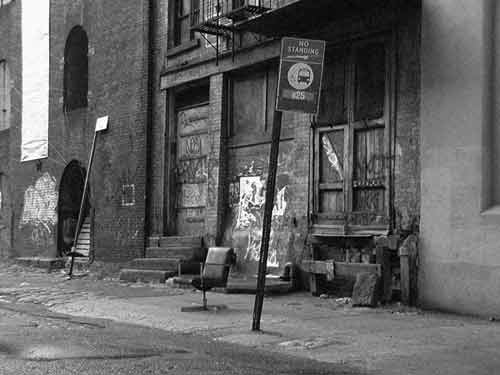Things Were So Much Better When They Were Filthy and Disgusting? Not.
 Gowanus Lounge was amused by a reader's reaction to our "Brooklyn Nostalgia Moment" photo of Dumbo in 2001. The words that went with the photo said, in effect, that the pace of change in some Brooklyn neighborhood is so fast that "nostalgia" can happen overnight. Here today. Gone tomorrow. This led the reader to (anonymously) write:
Gowanus Lounge was amused by a reader's reaction to our "Brooklyn Nostalgia Moment" photo of Dumbo in 2001. The words that went with the photo said, in effect, that the pace of change in some Brooklyn neighborhood is so fast that "nostalgia" can happen overnight. Here today. Gone tomorrow. This led the reader to (anonymously) write:"Yeah, things were so much better when they were filthy and disgusting and contributing nothing to nobody. Curse those bastards who are making use of decrepit buildings and having the audacity to clean up the streets."GL admits to enjoying a neighborhood like Dumbo for what it was when it was a relative secret and one could go there and have that wonderful feeling of being a little alone in one's enjoyment of it. Change, however, is inevitable. Cities that don't change die. (To have watched the near death spiral of hundreds of American cities through the 1970s and 1980s is to know that stagnation rips out a city's soul and that change and growth promote life.)
The issue is the nature of the change and what excessive density does to our lives. It is about allowing 40-story buildings where 10 or 15 or 20 floors make more sense. It is a development process that hinges more on political money and power than smart planning.
In a different era, when the issue was murdering communities with big public projects like highways, there were those who said that questioning the megalomaniacal plans was to oppose growth and progress. Today, those that oppose a huge or out-of-scale development are accused of wanting to preserve abandonment and decay.
The issue is not development versus no development; it is overly-dense development that overwhelms and homoginizes versus sensible growth that respects the fabric of a community.

0 Comments:
Post a Comment
<< Home